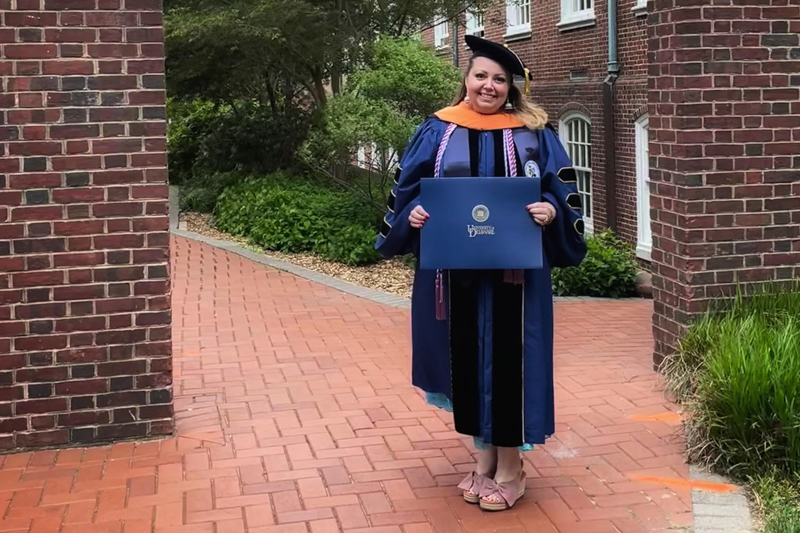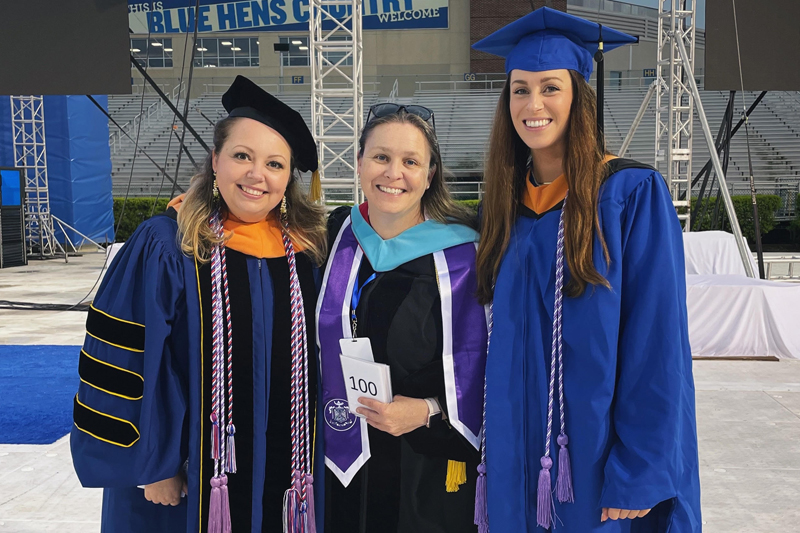


The next battlefront
Photos courtesy of Rebecca Ivory November 06, 2023
UD School of Nursing alumna a nurse leader in veterans' mental health
In the mid-2000s, John*, a U.S. Navy SEAL, was on board a vessel for a search and seizure operation in rough seas near Africa. He was wearing heavy body armor and carrying equipment, weighing 90 pounds. John had to board the ship by climbing up a rope. As he twisted and turned, climbing up the rope amid high winds, he injured his shoulder, spine and hip. He reported his injuries to the Navy and had one option — surgery.
“I declined because if surgery went bad, it would have ended my career,” he said.
His injuries evolved into chronic pain.
“I was living on ibuprofen for my last eight years in the SEAL Teams,” he said.
John retired in the mid-2010s after 20 years of service, mainly as a SEAL. During that time, he did five deployments and many shorter missions overseas.
After retirement, John started experiencing nightmares, insomnia and flashbacks to horrific moments during his missions.
“I’d have physical reactions, sweaty palms, increased heart rate and trouble breathing,” he said.
John, who was married with children, also started struggling with family relationships.
“I think I developed ADHD in the Teams; I can’t concentrate or focus and often have intrusive thoughts,” he said. “My memory also isn’t as good as the civilians I work with who are older than me.”
He didn’t know it yet, but John was exhibiting classic signs of Operator Syndrome, a predictable and specific pattern of healthcare difficulties within the Special Operation Forces community, according to the International Journal of Psychiatry in Medicine. Operator Syndrome is caused by chronic exposure to micro brain injuries and a cumulative burden of chronic stress. It’s an area in which psychiatric nurse practitioner Rebecca Ivory specializes. She’s one of just a few published experts on the subject.
“There’s very few people doing this work,” Ivory said. “And it’s so profound. It’s an honor and privilege.”
The three-time University of Delaware alumna, who most recently obtained her doctorate in nursing practice (DNP) from UD’s School of Nursing (SON) in 2022, now consults for the SEAL Future Foundation (SFF) and serves on SFF’s Board of Health.
“Special Operators are chronically exposed to blasts from high-power firearms, controlled ordinance and improvised explosive devices,” Ivory said. “This exposes their brain to blast waves, creating scarring on the brain and disruptions in the hypothalamic-pituitary-adrenal (HPA) axis. Between the scarring and HPA disruption, we see major medical problems. We then see the downstream effects of their brain being rattled around chronically.
“Chronic stress overload is another contributor to Operator Syndrome. Special Operators experience physical and psychological stressors throughout their career that are relentless and oppressive more so than the average servicemember.”
Ivory, a project lead at the University of Washington School of Nursing, became interested in Operator Syndrome through her doctoral work at UD, an institution uniquely suited for her to pursue her DNP.
“I could not have done this work if I had gone to almost any other school,” Ivory said. “UD School of Nursing had several faculty members who were veterans or were spouses of the military, and several more who have dedicated much of their career to working with veterans. Having those experts was important to me.”
During the final year of her doctorate, Ivory’s husband deployed as a commanding officer of a Navy squadron.
“Having people like Dr. Jennifer Graber and retired professor Dr. Sue Sheehy, a veteran, who not only supported the work I was doing, which was really stressful, but also supported me while my husband was deployed was crucial,” Ivory said. “They opened up every resource to ensure I was successful.”

Graber, now associate dean of academic affairs and practice initiatives for SON, put a bug in Ivory’s ear about entering the field of psychiatric nursing.
“I really hadn’t thought about a career in psychiatric nursing, and that conversation and the years that followed helped shape my career path,” Ivory said. “When I returned to UD for my DNP, there was no one else I wanted to work with.”
Typically, DNP students don’t do research studies, but Ivory was determined.
“Many nursing programs weren’t receptive to the idea, but UD was ready to accommodate,” Ivory said. “Dr. Graber educated me through a process that would’ve been nearly impossible anywhere else. She’s the best faculty member and mentor in academia I’ve ever had.”
Now, Ivory, an expert in Operator Syndrome, presents at conferences alongside her mentor.
“It’s really amazing to see this come full circle with Dr. Graber having guided me as a student nurse to the psychiatric nursing professional I am today,” Ivory said. “It’s really a testament to how things are done at the University of Delaware in the School of Nursing.”
Graber was Ivory’s advisor in her accelerated nursing and DNP programs and has watched her grow.
“Rebecca is doing such specialized work with such a vulnerable population, and I am so proud to see her dream come to fruition,” Graber said. “Through her work with Special Operation Forces, Rebecca is bringing information to the nursing community, which may have never heard of Operator Syndrome before. This education piece is crucial because nurses care for people from all walks of life, and without asking the right questions, care can be hindered. This is what makes Dr. Ivory a nurse leader in veterans’ mental health.”
Ivory’s DNP research centered on chronic pain and trauma among Naval Special Warfare veterans and psychoeducation. She noticed several themes in conducting more than 100 background interviews with Navy SEALs for her dissertation.
“Chronic pain, trauma, anger, anxiety, rumination, weight gain, inability to recover after routine exercise, insomnia — it was an unusual jumble of conditions,” she recalled.
But her nurse’s intuition told her they were intertwined. Ivory connected with Chris Frueh, a clinical psychologist and chairman of the SFF Board of Health, who first published the unique constellation of medical and behavioral healthcare needs among special forces known as Operator Syndrome, symptoms of which often develop between five and 10 years of active-duty special operations work.
John read that paper in 2021 and said, “I thought it was written about me.”
That led him to connect with Ivory through her private practice, Tactical Psychiatry, PLLC.
"I didn't think I needed therapy,” John said. “I never considered it.”
Ivory remembers when John first came to her.
“Most SEALs feel pretty desperate by the time they get to me,” Ivory said. “Many Special Operators have had unsuccessful treatment elsewhere, and no one can figure out why they can’t sleep, why they’re exhausted all the time, or why they have chronic pain when imaging shows no signs of it.
“SEALs experience unique physiologic and psychological consequences of their service, and traditionally trained healthcare providers don’t receive any specialty training to provide culturally appropriate care, which involves understanding Operator Syndrome.”
Special Operators often feel like they’re on an island, struggling in silence. Ivory helps SEALs like John realize they’re not alone.
“I instill hope within them and let them know — we can get our arms around this,” she said. “Most people say they feel better after we talk because it gives them a sense of hope.”
Getting off that island was half the battle for John.
“I feel like I have a plan now, and I’m making a point to educate my friends on Operator Syndrome so they know they’re not alone,” he said.
Rather than provide traditional therapy, Ivory’s work with Operators focuses on problem-solving, education and connections to community and resources.
Ivory has also brought SEALs into her research and learned that helping them tell their story is another form of therapy. She recently co-authored an article in the Delaware Nurses Association Reporter with a former SEAL sniper, nicknamed “Hoagie,” who’s working to get his master’s in social work.
“I am very intentionally working with current and former Special Operators to bring them into research science and mentor them to go into health sciences,” Ivory said. “Many veterans, including Special Forces, appreciate and value helping their community as they exit the military. They have a real sense of altruism and want to give back and improve life for those coming after them.”
Ivory’s goal is for SEALs to achieve wellness — whatever that looks like for them — through medical assistance, healing, research and scholarship, or storytelling.
“I want them to feel well and be well,” Ivory said. “But I’m also a big believer in graduating patients. I want them to be able to achieve their goals on their own.”
She’s also on a mission to recruit and mentor more people like her.
“There could be 10 of me, and we would still feel overwhelmed,” Ivory said. “We need more people doing this important work.”
You’ll hear her repeating sage advice from her mentor, Graber.
“You would be good at this,” she’s quick to tell talented psychiatric nurses, who she believes have a skillset uniquely suited for this work.
“You need cultural competence, and you need to take the time to understand the community to do this work,” Ivory said. “Special Operators are very open to talking to nurses, and I think nurses have the bedside manner and patient collaboration expertise to make an impact.”
Aside from the world needing more people like Ivory, she wouldn’t change a thing about her path.
“I really love working with this community; the things that they have experienced, the hardships they’ve endured — it is an honor that they trust me to help them,” she said. “I do not take this work lightly. Psychiatric nursing is a calling, and working with this community is a calling. I feel very lucky to do this work, especially with the SEAL community, which is very closed off; they do not allow strangers in. Building relationships and being allowed into this community took time, and now I’m a trusted guest. It’s an honor.”
*Editor’s note: A name was changed to protect the identity of a Navy SEAL.
Contact Us
Have a UDaily story idea?
Contact us at ocm@udel.edu
Members of the press
Contact us at 302-831-NEWS or visit the Media Relations website

